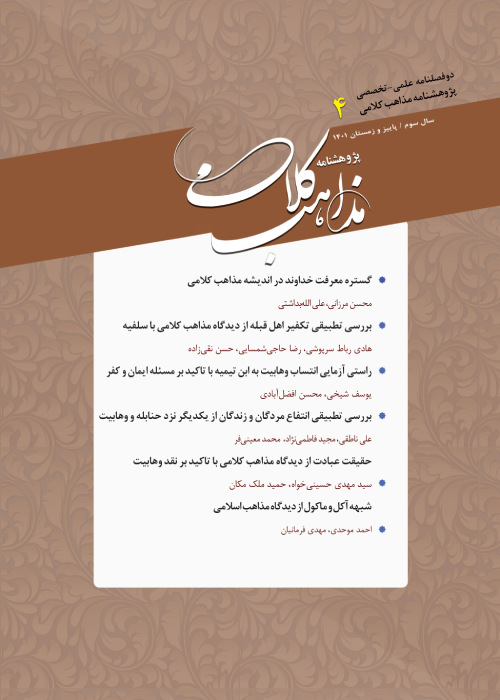A Criticism of Wahabism about Verse 18 of Surah al-Jinn (72)
Author(s):
Article Type:
Research/Original Article (بدون رتبه معتبر)
Abstract:
The verse 18 of chapter 72 of the Quran says, "And that the mosques are Allah's, therefore call not upon any one with Allah". Wahhabis insist that this verse alludes to prohibition of appealing to anyone other than Allah. They believe appealing to someone other than Allah amounts to worshiping someone other than Him and it is an act of shirk (polytheism). They maintain that such calls are in explicit contravention of the verses of the Quran, sunnah of the Prophet (S) and normative conduct of the predecessors. In this article, the opinion of Wahabism is challenged with arguments put forth to prove that such appeals in general is not worship of a being other than Allah. The prohibition denoted in the verse (call not upon anyone) forbids worshipping anyone other than Allah. In fact, the appeal (du'a) that has been forbidden in the said verse is one that is combined with one's belief in divinity of another entity. Just as Wahabis say, God has forbidden us to call upon anyone other than him, we must note that that another being who must not be called upon is another god, not anyone other than Allah. If appealing to someone other than Allah was forbidden in a general way, then the question arises as to why Prophet Solomon appealed to the chiefs, and Moses' tribe appealed to him and Prophet Moses appealed to Prophet Khidr. Why didn't they ask Allah to fulfill their wish? That is because if an appeal is made to someone other than Allah with belief in lordship and divinity of that thing, it is then considered shirk and worshipping someone other than Allah. However, if there is no such belief, it is a kind of seeking help and cooperation, and there would be no objection to someone doing this. In this study, the differences between 'worship' and 'dua' (supplication), the objective manifestations of appeals made to someone other Allah in the Quran, Sunnah and normative conduct of predecessors have been discussed. As well, the affirmation of this trend by textual proofs has been dealt with.
Keywords:
Language:
Persian
Published:
Theological religions Research Journal, Volume:1 Issue: 1, 2021
Pages:
9 to 38
magiran.com/p2596324
دانلود و مطالعه متن این مقاله با یکی از روشهای زیر امکان پذیر است:
اشتراک شخصی
با عضویت و پرداخت آنلاین حق اشتراک یکساله به مبلغ 1,390,000ريال میتوانید 70 عنوان مطلب دانلود کنید!
اشتراک سازمانی
به کتابخانه دانشگاه یا محل کار خود پیشنهاد کنید تا اشتراک سازمانی این پایگاه را برای دسترسی نامحدود همه کاربران به متن مطالب تهیه نمایند!
توجه!
- حق عضویت دریافتی صرف حمایت از نشریات عضو و نگهداری، تکمیل و توسعه مگیران میشود.
- پرداخت حق اشتراک و دانلود مقالات اجازه بازنشر آن در سایر رسانههای چاپی و دیجیتال را به کاربر نمیدهد.
In order to view content subscription is required
Personal subscription
Subscribe magiran.com for 70 € euros via PayPal and download 70 articles during a year.
Organization subscription
Please contact us to subscribe your university or library for unlimited access!



